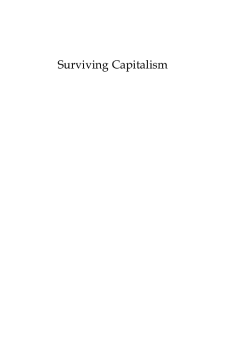
Additional Information
Book Details
Abstract
Human life cannot be reduced to market transactions and human beings cannot only be treated as economic actors. When the power of the market increases, human beings will always try to protect themselves. Given the differences that exist in social and cultural traditions, these protective responses are likely to differ from one society to the other. This is why, even in a global market, diversity is always likely to persist. This book investigates the question of economic globalization - whether it is likely to lead to full convergence between political models and ways of life, or whether, even in a completely globalized world economy, there is likely to be scope for alternative solutions. But in a fully globalized world, how will we survive capitalism?
This book investigates the question of economic globalization - whether it is likely to lead to full convergence between political models and ways of life, or whether, even in a completely globalized world economy, there is likely to be scope for alternative solutions. In a fully globalized world, how will we survive capitalism?
''Surviving Capitalism' presents a highly literate cost–benefit analysis of the history of capitalism…fresh, fascinating, relevant, and, yes, humane.' —Jeff Madrick, editor, 'Challenge Magazine'
Erik Ringmar is a Professor at the National Chiao Tung Unviersity, Hsinchu, Taiwan. He is the author of 'Interest, Identity & Action' (CUP 1996), as well as many academic articles in the fields of history, international politics and sociology.
'Clearly and gracefully written, it presents an interesting and fertile thesis about the nature of capitalism and how different societies have learnt to cope with it.' —John Gray, author of 'Straw Dogs' (Granta, 2002)
